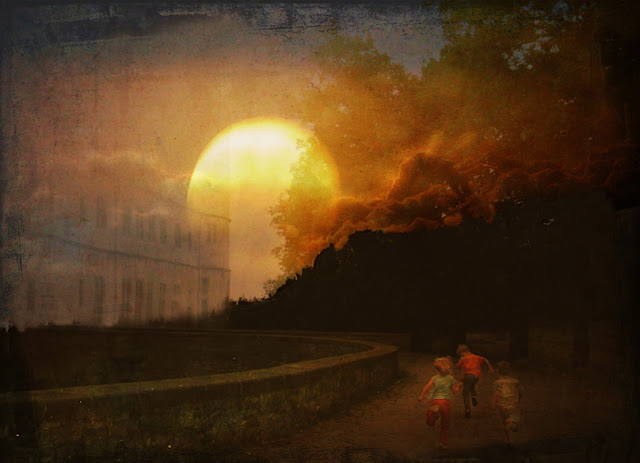Revising
is not the same as editing.
Many writers see the word revision as “to see again,” and then
they re-read their manuscript for consistency, for errors, for overused words. They re-read for cliches and pacing. This is hardly
more than editing.
 |
| Revision isn't just seeing again. Image: "Image from page 21 of ”Traité de chirur" (Public Domain) by Internet Archive Book Images |
These
writers are missing a key step: re-visioning.
When
you really look at the word revision, there are deeper
meanings to it than simply seeing again. Yet, the
words revision and edit are frequently used interchangeably and this may be why so many books miss the critical
step of revision.
If
you don't believe me, take a look at the history of the words. Even
in the simplest interpretation of the words, to edit is
not to see again, so why do we edit and call it revising?
- edit
(v.)

- 1791, "to publish," perhaps a back-formation from editor, or from French éditer or Latin editus, past participle of edere "give out, put out, publish." Meaning "to supervise for publication" is from 1793...
In the 1790s, editing meant preparing for
publication, according to EtymologyOnline. But it was nearly 100 years after the term
came into existence that the meaning of editing became crossed
with revising.
Commonly,
we think of revision like this:
re-: to
do again.
-vision: to
see as in eyesight... the ability to see.
Why
do we forget all the other definitions of vision? We actually
use the word in a lot of different ways regularly. Does this ring a
bell?
- re-

- word-forming element meaning "back to the original place; again, anew, once more," also with a sense of "undoing," c. 1200, from Old French and directly from Latin re- "again, back, anew, against."
- The act of seeing comes in last in this definition.
- But how often do we hear writers say things like, “The novel lost its vision and direction after so many critiques”? Or, “The story came to me in a vision”? How many authors have had a vision of having a New York Times best-seller? Do you know any writers who lost track of themselves and developed visions of becoming the Shakespeare of their time? Have you ever read a book review of a fantastic novel that is touted as a vision of history and poetics merged?
- That's five different uses of vision beyond the act of seeing.
- 1. The ability to think about or plan the future with imagination or wisdom. “The novel lost its vision and direction after so many critiques.”
- 2. An experience of seeing someone or something in a dream or trance, or as a supernatural apparition. “The story came to me in a vision.”
- 3. A mental image of what the future will or could be like. “... a vision of being a New York Times best-seller...”
- 4. A vivid mental image, especially a fanciful one of the future. “...a vision of becoming the Shakespeare of his time.”
- 5. A person or sight of unusual beauty. “...a vision of history and poetics merged.”
If we consider
vision as any one of these definitions, re-visioning
becomes more about imagination, creativity, inspiration, insight,
inventiveness and much less about correcting or fixing what we've
written.
 |
| Re-dream your story. Image: "dream of life" (CC BY-ND 2.0) by AlicePopkorn |
If
we think of revision as putting our book down after writing it and going back to our starting point, then we process what we have come to in the end and can start over with a new
image of how to see the novel as it has evolved in meaning and
character from when we first began writing it.
Re-visioning
is not the torturous process of preparing a book for publication, but
a new opportunity to re-imagine the book as even better than it is
now. It's time to lay on the floor and begin re-thinking what this
book can be, what these characters can be, what this story can be.
It's time to re-enter the dream state. It's time to channel the
characters again, now that we know them better. It's time create that
vision of beauty that the novel can be.
It's
not time to edit.
It
is time to make this book incredibly good—so good it will blow
minds. So good everyone will be talking. So good that it will live on
for the next hundred years.
That's
what revision is.
What an inspiring post. I must revise my work properly from now on.
ReplyDeleteThank you, Viv. I think the revision is the best part of writing.
ReplyDeleteThat's an interesting point of view. For sure, a first draft can change significantly--but that's not necessarily always the rule.. The problem with re-visioning is that nobody likes the idea of having to rewrite extensive parts of the story they have already written. Hence... editing.=)
ReplyDeleteOf course there are no absolutes in the process of writing. Some people can writer fantastic first drafts--not me, and not most of us. Not liking to rewrite, though, does not mean it shouldn't be done if a writer wants to produce ambitious work. Do you revise, Peter Rey?
DeleteSorry for the late reply, Robin. Yes I do revise. There's no other way around for me. Usually, my first drafts are quite skeletal. This is so because I want to keep up with the flow of the story going on in my mind. After that I start adding flesh and rewriting parts as needed. It's a messy process, but when I'm done I find it quite rewarding. =)
DeleteI hear you, Peter! Sounds similar to my most recent process!
DeleteGreat post Robin!
ReplyDeleteThanks, KD!
Delete